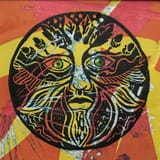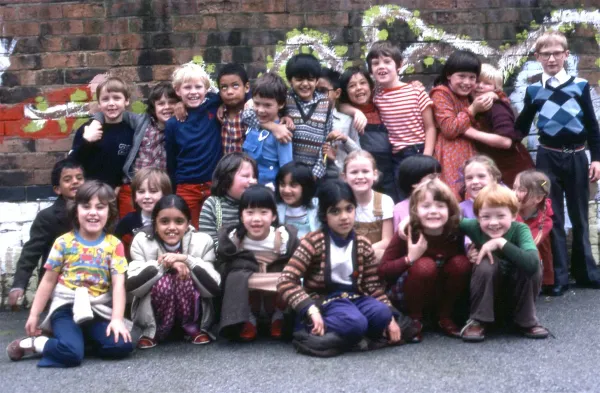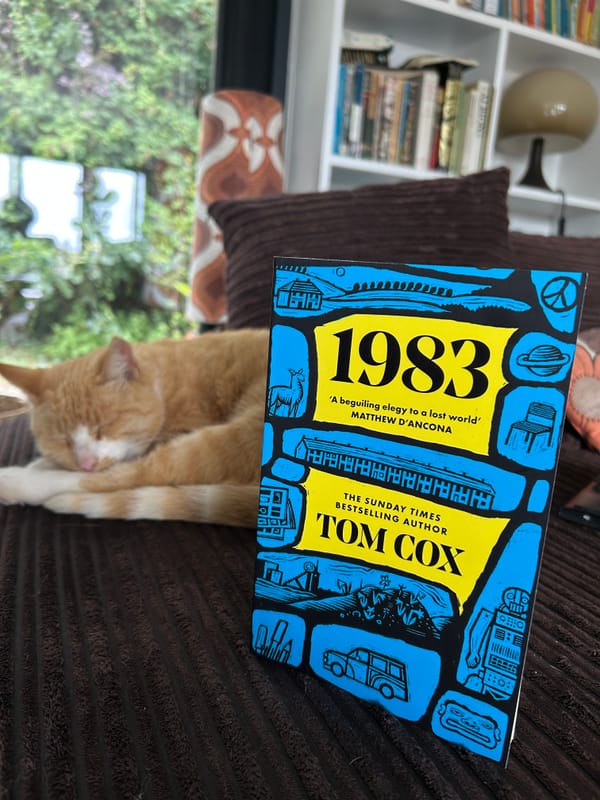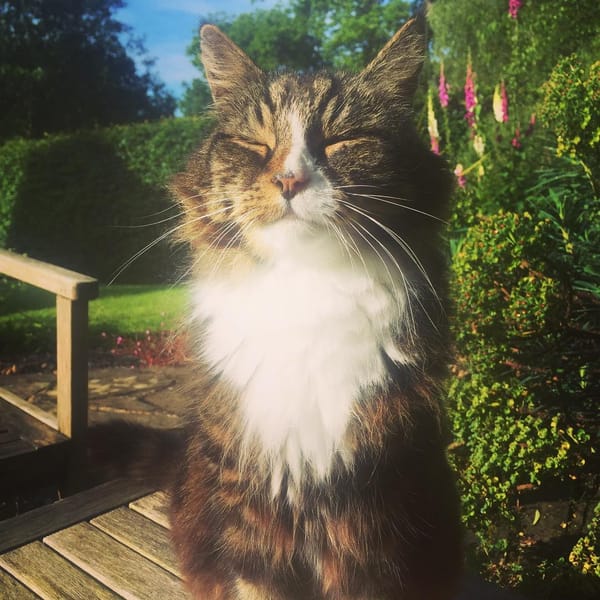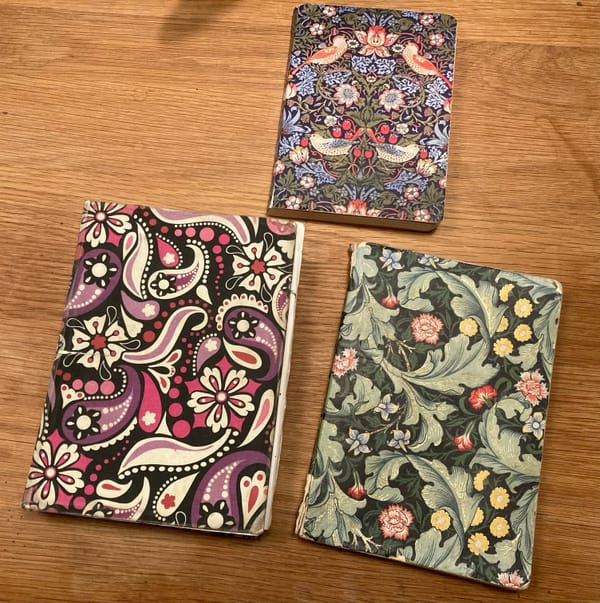An Embarrassment Of Tinned Meat (Seven Tiny New Stories)
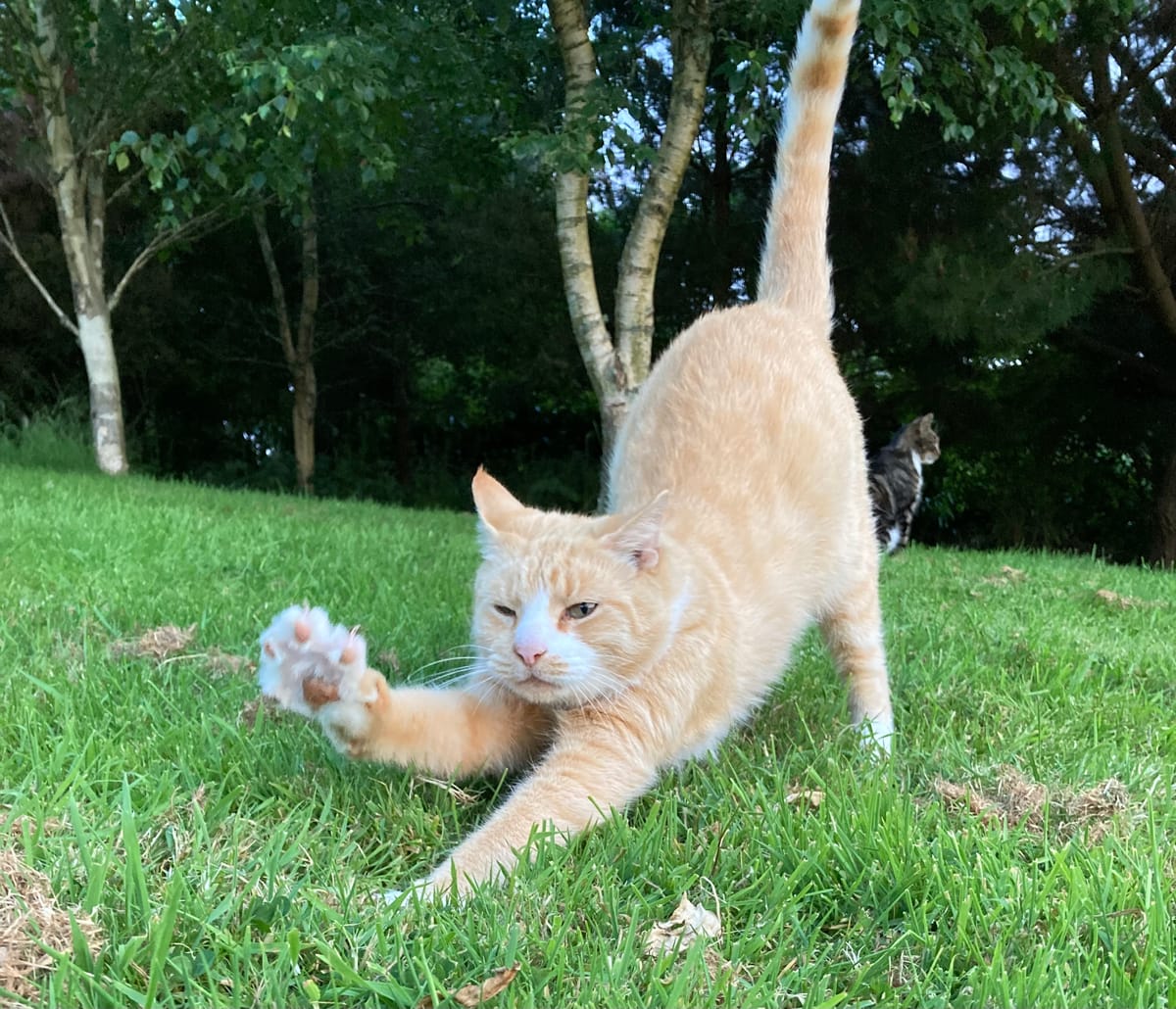
Thanks for joining me here, away from the noise of the Substack app, on my renovated newsletter. It's pretty much the same as the old one, except I'm keeping everything unpaywalled for now, and have set up a selection of subscriber options, from £1 per month, for those who feel they can support my writing (PLEASE NOTE: if you were already a paying subscriber before I switched from Substack to Ghost there's nothing you need to change as your previous sub will have carried over automatically). I'm hoping it will be a fairer, more inclusive way of doing things, and give me more time for creativity and research. What I've been mostly working on recently is a new collection of (at times very) short stories and I've included a few of the more compact ones below. You will be the first people to see these, aside from my regular proofreaders (see accompanying photo). Incidentally, my current shortlist for the title of the full collection is:
1. Mysterious Events Lately Occurring In This Neighbourhood
2. How To Be Some People
3. Building A Stone Backwards
4. An Embarrassment Of Tinned Meat
1 has been the forerunner for yonks and will almost certainly make it across the finishing line. But I have become fond of 2 and 3 (a phrase Ellie said this week during a conversation about my recent dental problems, which I thought had a nice ring to it) of late. Those 'How To' titles have, over the last decade and a half become hackneyed marketing department book title brain-rot, in the same way that calling your novel The Diagonal Carpenter's Nephew or some other title with a relative in it was in the early 2000s. But, being the contrarian I am, I quite like the idea of having a How To book that tells you absolutely sod all about how to do or be anything. I also like the idea of someone picking it up by mistake, reading part of it then complaining about it on Amazon. ("I bought this book purely on the promise it would help me become some people. It has done no such thing, and, like all books of fiction, has the major drawback of featuring individuals who don't exist. FALSE ADVERTISING. 1 STAR OUT OF 5.") But that's probably not the best reason to choose the title of a book, especially one you ultimately hope will fall into the hands of the audience it's aimed at. I think, meanwhile, that I've written off working title 4 altogether. Hence I thought, before I say goodbye to it, the least I could do is give it a send-off by making it the title of today's newsletter.
MYSTERY SHOPPER
For a few years, back in my 20s, while I was still wondering what to do with my life, I picked up some work as a Mystery Shopper. I don’t miss it, but it was far better than working in some monotonous office job, and my employers always appeared satisfied with the amount of mystery I created. I would tend to wait until the day of trading had reached its bustling zenith before I dramatically threw off one of my diguises, which included ‘disorientated beekeeper’, ‘recently liberated telemarketer’ and - if it happened to be Halloween - ‘slutty tree surgeon’. Many of the other shoppers would put a hand to their mouth in shock and laugh, some of them even going so far as to yelp with unbridled joy, but then a sense of anticlimax and a stifling silence would inevitably follow as it dawned on everyone that behind the disguise all there was to see was a generic-looking stranger with nothing of genuine interest to announce or add to their day.
THE ALOOF HOUSEMATE
They say you are never more than six feet from a rat but that didn’t stop Eileen feeling like she was more than six feet from her local rat, who was extremely guarded about his emotions.
FAMILY HOLIDAYS
My early childhood holidays were all quite unexciting and parochial: semi-rural campsites in Yorkshire, mostly, and a couple of less than memorable Scottish hotels. But when my parents both got promotions at work they decided to take a generally bolder approach to their free time, so for five or six years in a row, every July and August, they would take me and the rest of the family into outer space. The moon was our favourite destination, but sometimes we’d also journey as far as some of the closer planets in the solar system (although not Jupiter, since our paternal grandmother had always been acutely susceptible to cold weather). There was not a lot to keep young people occupied on these planets back in those days, but I'm proud to say my sisters and I had no trouble making our own entertainment with the help of nothing more than a bucket and spade, the natural geological forms available to us and our fertile pre-teen imaginations. It flabbergasts me now, thinking of the energy that went into these trips, particularly on the part of my mum, who always did almost all of the driving. “Look! I can see the molten boundary layer!” my sister Grace would shout, as we approached the moon, and suddenly all the pain, tedium and squabbling of the long trip would be forgotten. It reminds me that, in the end, travel and your definition of it is all relative and about what you have become accustomed to. To offer an example, for my friend Walter, who lives on the East Coast of America, New York to Boston is just a little nip of 217 miles: the exact same distance between my home, here in Glasgow, and York, which to me is an extremely frightening and foreign place, full of people with weird voices and expensive clothes. Part of me feels like I could repeat those trips taken by my family, if I really tried, and even get myself and my own wife and children used to them, but trying is not my forte, and I have grown up to be more of homebody. As fond as my memories are of my childhood holidays to Mars, Venus, Mercury and the moon, I am happy to let them remain precisely that - memories - and have no desire to recreate them. Besides, as we all know, every one of those places has been ruined by Instagram tourism now.
THE DAY MY DATA WAS STOLEN
I had my data stolen. As crimes go, it was very much on the rise, but, being generally ignorant of things on the rise, I had taken not nearly enough precautions to protect my data from conmen, thieves and the unscrupulous half-robot people lurking on the sliproads of the information highway. In the end, I had to get the police involved and everything. Fortunately it turned out, via further investigation, that my data had just been a sheet of yellowing A4 paper filled with mathematical symbols and numbers that were utterly meaningless to me. In all honesty, I was glad to see the back of it.
THE ARCHITECT
Max Waldheim was one of those uncompromising visionaries for which the middle years of the 20th Century were a prolific incubator, who would not let politics, fear or budgetary concerns interfere with the movie he saw constantly running in his head, showcasing a better domestic future for the entire human race. He was plaintively aware that future would not arrive during his lifetime, but he saw this as no reason to stop working doggedly towards it nor to cease blanking out the Conservative bleating of the naysayers and cowards. Many poured scorn on his more outlandish designs, such as the five-bedroom ranch home he once built in the Mojave desert on top of a standard-sized British garden greenhouse, but he knew history would be the true judge.
Far more committed to his legacy than his life, which contained a total of nine divorces and fourteen neglected children, Waldheim died relatively young and completely artistically uncompromised, in the manner he probably would have wanted to, after falling into a controversially deep conversation pit he had hollowed out in the living room of a house he’d been building for a renowned Hollywood womaniser. He had sacrificed many friendships and a simpler life in his pursuit of what he saw as the Greater Good. Specifically: more beautiful and comfortable living arrangements for all, the narrative texture of the films and books that would one day be written about him, and an extraordinarily impressive entry on Wikipedia (a website whose existence he had, in one of his most mindbendingly far-sighted moments, predicted as far back as June, 1958). As he had foretold, his greatest accolades arrived posthumously but so, unfortunately, did his greatest disappointment when, arriving in heaven, he discovered that all the houses were cheap and homogenous, with thin walls and an aesthetic sensibility mindlessly imitative of earlier architectural styles. Panicked, he immediately sought the counsel of Mies van der Rohe, Philip Johnson and Frank Lloyd Wright, who he was scandalised to discover were all lodging together in one cramped room in a house owned by the surprisingly nice but tasteless manager of a corporate law firm: a mock Tudor executive home with a cooltone floor, a trite inspirational slogan on its door mat and a pointlessly huge clock on its living room wall. “What on earth happened?” Waldheim asked. “We wondered the same thing at first,” replied the three great men. “But it’s just the way it is and there’s no choice but to accept it. Nobody anticipated just how many people would end up here. It leaves little room for idealism.”
MY EX-LOVER
At the gig, I looked across a crowded room and spotted, for the first time in a small epoch, my ex-lover, sipping on a pint of the same noxious extra strength lager she always used to favour. I held no major negative feelings towards her but, all the same, I chose not to renew our acquaintance. Yet from the moment I set eyes on her I felt something wholly curious happening to me. I was suddenly profoundly conscious of all the physical ways of I had changed in the years since we’d last talked. There was the half-roll of sellotape hanging off my chest, for example, the gramatically inaccurate tattoo on my left arm and the two balls of old newspapers tied to my knees with string, and that was just the beginning. I will confess to you that I was emotionally rocked. Because of this I chose not to stay and watch the band, instead embarking on a long walk home, casting off various objects in public parks and the gardens of strangers.
THIRTEEN DOGS
Thirteen dogs came over the hill into the village at sundown. The villagers immediately said it was a bad omen. The villagers were, however, incorrect. The dogs were not a harbinger of dark times to come. The dogs were the dark times and they were here now. The larger dogs immediately set to work biting the legs off antique tables, destroying treasured tapestries and hotwiring cars with their teeth. The smaller dogs, meanwhile, began a subtle campaign of repetition and annoyance, sitting uncomfortably close to the villagers while they slept and making ghostly whimpering noises in their ears. Soon, en masse, the villagers vacated their houses. It didn’t matter that most of them had no place to go and had called the village home for generations. It was all too much.
These lucky dogs now had everything they had ever wanted. In the store room of the village tennis club the dogs found such a vast number of small fluorescent balls that they fell on the floor laughing at their own good fortune. In the village museum one of the dogs located a medieval catapult which he was able to operate with his teeth, sending sticks high into the air for other dogs to chase. Since the village sat on top of a knoll in a dense forest, there would never be any shortage of sticks but, in that unlikely event, there was also always the fall-back option of the antique table legs leftover from the initial campaign of vandalism. Meanwhile in the three small supermarkets in the village the dogs discovered an embarrassment of tinned meat. They thanked their lucky stars that they lived in the age of the ring pull can since, while they could do many clever things with their teeth, operating a can opener was not one of them.
Soon, the easy pace of life made the dogs sloppy and complacent, so when, at sundown, around five weeks after they’d first visited, thirteen cats came over the hill towards the village, none of them said “I don’t like the look of this, lads” or “I feel this might be a bad omen”. What they said was “Brilliant! Some cats to chase and intimidate!” Because of this it was easy for the cats to execute their masterplan, leading the dogs down to the river below the village then, at the last second, jumping up onto low hanging branches, so the dogs fell into the water, where the merciless current washed them all the way to the sea.
As sole unchallenged owners of the village, the cats also found many objects with which to amuse themselves, including the many half-eaten cans of meat left by the dogs, over 300 writing pens and their lids, and the knitting projects that had been abandoned by some of the more creative villagers when they evacuated the area. They imposed their personalities on the place in a much more nuanced, intellectual way. But, being cats, they were soon bored. Also, the smell of the place was not to their liking. After only a few days, they moved on to their next project.
The village is a sad place now and, being well off the beaten track, it is rarely visited, except by the occasional bear or wood pigeon. People still call it the Dog Village, many of those who have never visited it assuming that it must be some vast kind of canine rescue centre or recovery community. Nobody ever mentions the cats, because people are busy and easily distracted by noise and that’s just the way history tends to work.
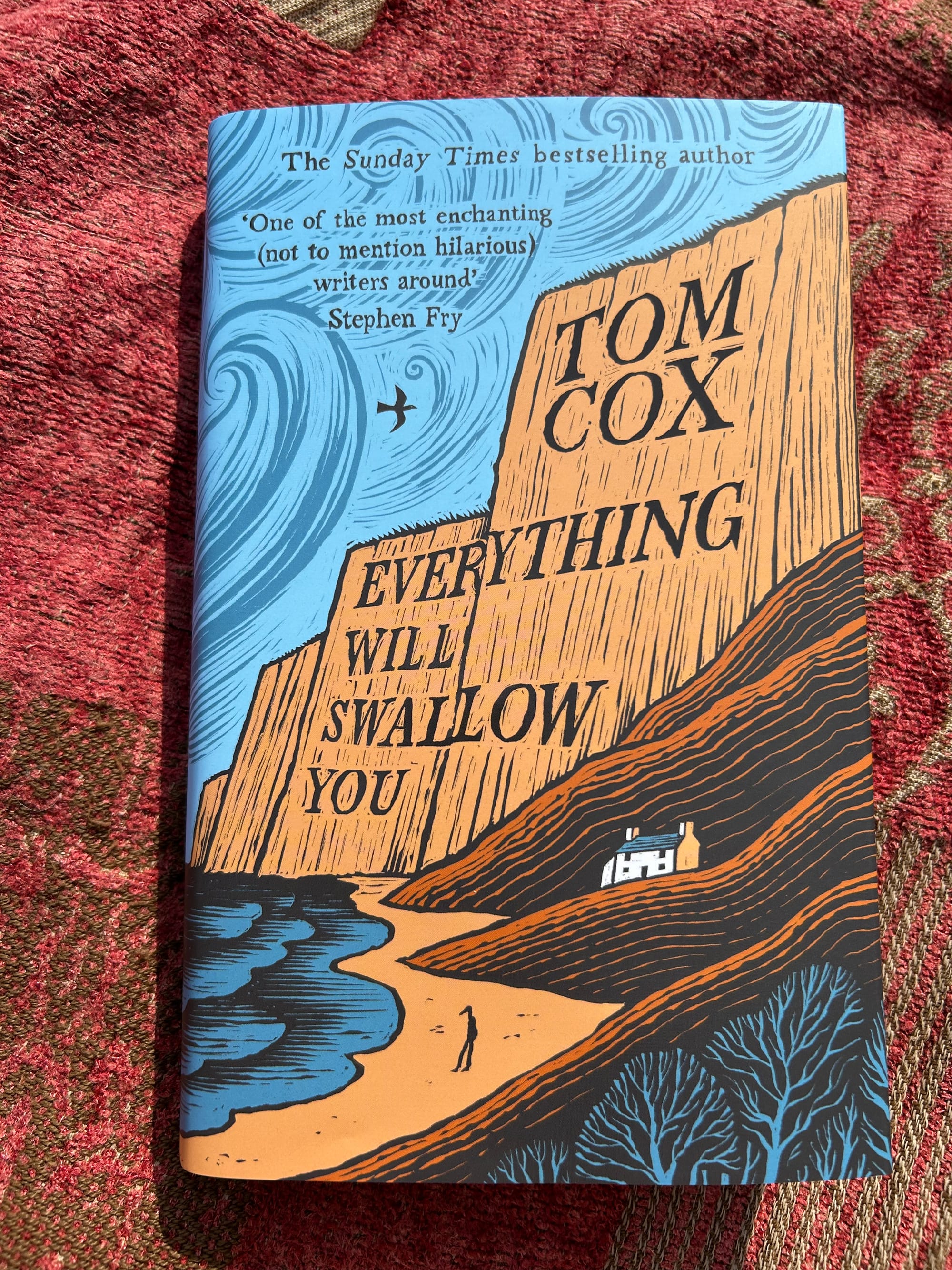
As you probably know by now, the paperback of my second novel, 1983, came out on Thursday, and the hardback of my third, Everything Will Swallow You, is being published on September 11th (you can pre-order a signed one, with free international shipping, here via Blackwell's UK). I'm also heading out on a little tour in September, in case you happen to be in the South West of the UK and would like to join me...

Tickets for Blackwell's, Oxford.
Tickets for Waterstones, Exeter.
Tickets for Field System, Ashburton.
